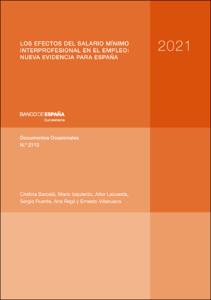Los efectos del salario mínimo interprofesional en el empleo: nueva evidencia para España
Authors
Barceló, Cristina; Izquierdo, Mario; Lacuesta, Aitor; Puente, Sergio; Regil, Ana; Villanueva, Ernesto
Issue Date
8-Jun-2021
Physical description
45 p.
Abstract
El artículo utiliza diferentes datos y enfoques para analizar el impacto en el empleo del incremento del SMI en 2019. Del análisis se desprende que, tras el incremento del SMI en dicho año, hubo un menor crecimiento del empleo del colectivo con menores salarios. El artículo desarrolla varios ejercicios alternativos centrados en el impacto sobre los grupos de trabajadores a los que va dirigida la reforma del SMI, que sugieren un mayor impacto adverso sobre el empleo de los colectivos de mayor edad y una reducción más acusada de las horas trabajadas y del flujo de creación de empleo para los jóvenes. Finalmente, utilizando datos de la hostelería, el artículo aborda las dificultades a la hora de identificar de manera inequívoca un grupo comparable a los trabajadores cuyo salario se sitúa en el SMI y de cómo esta circunstancia obliga a ser cautelosos en la interpretación de los impactos estimados.
This paper uses different data and approaches to analyse the impact on employment of the increase in the national minimum wage in 2019. It turns out that, following the increase, the employment of low-wage workers grew more slowly. Alternative exercises are carried out focusing on the impact on the workers targeted by the reform. These suggest a larger adverse impact on the job losses of elder workers and a sharper reduction in hours worked and in job creation for younger workers. Finally, using accommodation and food service activities data, the article addresses the difficulties of unequivocally identifying a control group comparable to workers whose wages are at the national minimum level, meaning that the estimated impacts should be interpreted with caution.
This paper uses different data and approaches to analyse the impact on employment of the increase in the national minimum wage in 2019. It turns out that, following the increase, the employment of low-wage workers grew more slowly. Alternative exercises are carried out focusing on the impact on the workers targeted by the reform. These suggest a larger adverse impact on the job losses of elder workers and a sharper reduction in hours worked and in job creation for younger workers. Finally, using accommodation and food service activities data, the article addresses the difficulties of unequivocally identifying a control group comparable to workers whose wages are at the national minimum level, meaning that the estimated impacts should be interpreted with caution.
Publish on
Documentos Ocasionales / Banco de España, 2113
Subjects
Salario mínimo; Diferencias en diferencias; Pérdida de empleo; Creación de empleo; Negociación colectiva; Mínimos de convenio; Minimum wage; Difference in differences; Job losses; Job creation; Collective Bargaining; Minimum wages under collective agreements; Mercado de trabajo; España
Appears in Collections:












